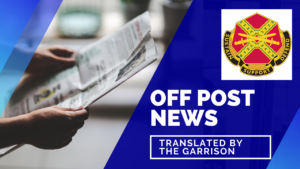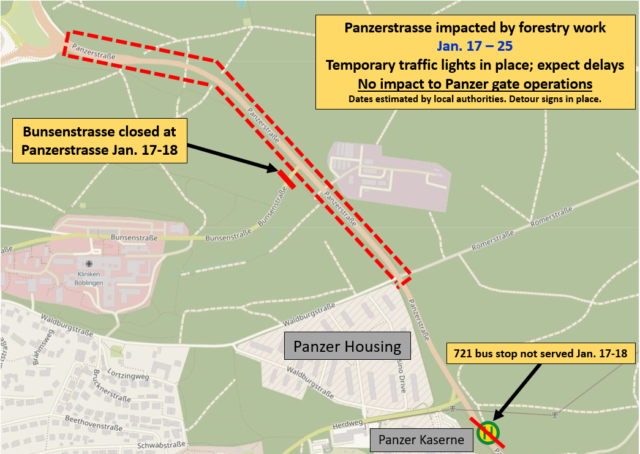
Host Nation Update, Jan. 17, 2023
Panzerstrasse affected by nearby tree felling

Weather in the region – There will be snowfall in and around Stuttgart
Winter is coming back to Stuttgart and the region, and it will stay that way in the coming days. Due to the cold temperatures, the chances are very good that it will snow soon.
Thomas Schuster of the German Weather Service (DWD) expects that it will be already on Wednesday morning. “The snow is coming and it will be significantly colder,” says the meteorologist in conversation with our editorial staff. According to the report, a snow front will approach from the southwest during the night on Wednesday, which could remain over the region until the afternoon. “It is certain that it will snow,” says Schuster. However, it is still unclear how much snow will fall. Since it is more likely to be light precipitation, the duration is critical, he said. The ground is cold enough for the snow to stay, he says. According to the meteorologist, the maximum temperature on Wednesday will also be a maximum of two degrees Celsius. It will be warmer than zero degrees for a few hours at most. Cold air will remain predominant. At night, there will be continuous frost anyway. So winter services and residents need to be prepared to clear roads and sidewalks Wednesday morning. “It will have an impact on rush-hour traffic,” Schuster said. Anything between two and six centimeters of snow is possible, he said. In the Black Forest and the Swabian Alb, the DWD expert expects a snow depth of more than seven centimeters. The snow line moves between 100 and 200 meters, there is also the state capital above. On Wednesday, snowfall is possible in Stuttgart and the region until about 5 pm. But it could also be that the snow front moves on faster, says Schuster. (Stuttgarter Nachrichten, Jan 17)
Problems at “Engelberg” tunnel caused by a technical malfunction
UPDATE: As of approximately 1:30 p.m., two lanes are open in each direction, but significant traffic jams persist in the area.
Due to an alarm that was set off at Engelberg Tunnel, the Autobahn 81, which runs between Heilbronn and Stuttgart, has been closed in both directions. On Monday, kilometer-long traffic jams formed on the A81 and the A8. It was not until late in the evening that one lane in the tunnel in the direction of Stuttgart was reopened, followed on Tuesday morning by one lane in the direction of Heilbronn.
According to a spokesman, a fire alarm had been received on Monday. The tunnel was then automatically closed in both directions: The traffic lights in front of the tunnel switched to red and the barriers closed. The fire department checked the tunnel, but found no source of fire. The police therefore assumed that there was a technical fault in the tunnel, but the cause remained unclear for the time being. (Stuttgarter Nachrichten, Jan 17)
BB New Year’s Reception – Here is how Lord Mayor Belz wants to make the city smarter
For the first time in three years, Böblingen’s city hall leadership invited guests to the New Year’s reception in the Europasaal of the BB Congress Hall. Approximately 1,000 people from Böblingen accepted the invitation to the recently lavishly renovated congress hall and were obviously very curious about what their Lord Mayor Stefan Belz had to say. Belz, who is in the fifth year of his eight-year term, formulated a clear vision for the city after the forced break caused by COVID; namely, to make Böblingen and Dagersheim a leading smart city. And this did not mean the Mercedes sub-brand, which for years had its administrative headquarters in the former IBM buildings along Leibnizstrasse, but now operates half from China, half from Leinfelden-Echterdingen. Böblingen is to become smarter, even without the Smartcar, and it rests on three pillars. The Green politician Belz wants to convert Böblingen into a climate neutral city by 2035. Several building blocks are intended to contribute to this: switching street lighting completely to LED by 2026, connecting even more households than the current third to district heating, and encouraging more people to switch to buses and trains with the 49-euro ticket. He wants to do everything in his power to combat the closing of “Gäubahn” rail line and the impending loss of the Intercity stop, and last but not least, more bike paths are to be built in Böblingen. Böblingen had landed in third place in the Stadtradeln (city biking) competition and had thus become the best catch-up in the inter-municipal competition in 2022. Then Belz turns towards his audience: “Maybe we will make it to first place in 2023?” In addition to the bicycle, however, e-mobility would also be a key, which is why he wants to set up 54 more charging points in Böblingen and 14 more in Dagersheim together with the municipal utilities as soon as the operation of the chargepoints has been clarified. Belz also placed great emphasis on environmentally friendly construction with a lot of wood, which the city is already implementing in the new Stockbrünnele school center.
The Sternsinger children (carol singers) of the Catholic Church, the big band of the Albert-Einstein-Gymnasium and the Dance Company of the Music School provided musical entertainment for loosening up in the midst of so much politics, which sent the guests swinging into the new year. (Stuttgarter Zeitung, January 17)
Innovation at the Böblinger Brauhaus (Brewery)
Serving robot “Bellabot” delivers drinks and food to the table independently. The electronic helper is not intended to replace the staff, however, primarily helps with heavy trays. The mood at the table of Frederik Jacques and his colleagues is relaxed to cheerful. And that’s not just because of the juicy burgers and the Böblingen beer that the four of them are enjoying during their lunch break. Rather, it’s the fact that the order arrives in a robot on wheels. “Hello, please take your order,” the voice says as the electronic waiter stops in front of the table and turns to face the guests.
“At first, you stare for a moment, but then the robot actually provides amusement,” Frederik Jacques says. After a morning work appointment at Mercedes-Benz, he and his colleagues stopped by the brewery. “We came here today from Munich, where I’ve seen this before at an Asian restaurant,” he says, grabbing his burger and fries from the robot’s belly. Scanners above the floor detect obstacles and make it stop when someone crosses its path. A camera on the top helps him find his way around the guest room. What’s amazing is that Bellabot always sees white dots in a certain pattern stuck to the roof beams of the brewery above the aisles. Chiumenti: “They have a similar function to a QR code; the robot recognizes them and then knows where it is.” On its back, LEDs show which table it is jogging to. All of this doesn’t come cheap: At around 20,000 euros, the price for this 1.30-meter-tall helper, whose battery lasts for a whole day. “At first, I was skeptical,” says Chiumenti, who, in addition to Schönbuch-Brauhaus in Böblingen, also has that in Calw and Stuttgart under his belt. “But the robot has clearly proven itself as a carrying aid. Especially with the heavy trays, it is a clear relief,” he says. The technology of such autonomous delivery robots has been in use for years in the logistics industry, for example. But in the catering industry, the brewery in Böblingen is one of the pioneers in the sector. “We don’t want to replace staff with the robot, it is purely a support.” The most sensible time to use it, he says, is around lunchtime. Then, he says, the volume of guests fluctuates greatly, and few make reservations in advance. “We always had two or three service staff on duty, but when there was more going on, they quickly reached their limits,” he says. Now he gets by just fine with two of them plus the robot. While some employees are happy about the support, others are more skeptical. Says Chiumenti, “It has to settle in.” (Stuttgarter Nachrichten, Jan 17)
